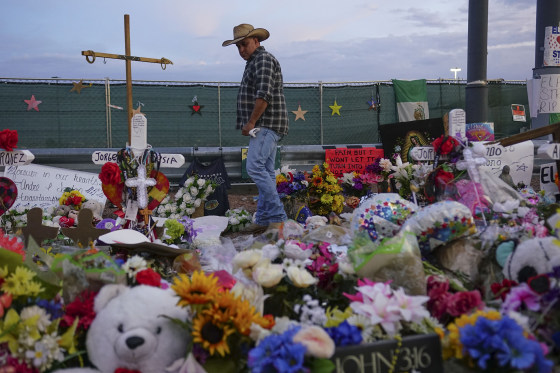In the five years since 23 people were massacred in the racially motivated El Paso, Texas, Walmart mass shooting, the incendiary rhetoric that motivated their murderer has worsened and become normalized, say leaders of anti-hate, immigration and antisemitic groups.
Families of those killed and 22 more who were wounded will mark the grim anniversary Saturday of the day a gunman who drove 700 miles to target Mexicans — as he told police after the shooting — ended the lives of their spouses, children, family members and friends.
Before the shooting, the gunman posted a screed online saying the shooting was his response to the “Hispanic invasion of Texas” and a replacement of white people by immigrants, echoing the “great replacement” conspiracy theory promoted by white supremacists.
Paul Jamrowski, father of Jordan Anchondo who along with her husband, Andre Anchondo, lost her life shielding her then 2-month-old son, said he’ll spend the day “reminiscing, remembering them, the people they were”.
But because of a gag order in the state case against the shooter, Jarowski said he could not discuss the gunman's motivations. The shooter was sentenced last year to 90 consecutive life terms after pleading guilty to federal charges that included hate crime charges. He still faces state prosecution.
The city's open wounds fester as the language used before the massacre by then-President Donald Trump describing the border as under “invasion” and the nation being attacked has spread and is now amplified, leaders of several organizations, including Human Rights First, the Border Network for Human Rights, the Jewish Council for Public Affairs and America's Voice, said in a press call Thursday.
At the Republican National Convention, delegates waved signs blaring “Mass Deportation Now” each night. Trump continues to decry a border “invasion” and he has repeated a phrase similar to one used by Adolf Hitler by declaring that immigrants are “poisoning the blood of our country.” A call to "seal the border and stop the migrant invasion" is the first of 20 items listed in the Republican Party platform.
Since the racist El Paso massacre, Trump has been joined by a chorus of others, largely Republicans, using the same language, said Thomas Saenz, president and general counsel of the Mexican American Legal Defense and Educational Fund, a civil rights group.
“We see more invasion talk than we saw back then. Certainly, there is lots more anti-immigration talk from Trump himself,” Saenz said.
On Wednesday, Trump told the audience at the National Association of Black Journalists conference that people crossing the U.S. southern border would take “Black jobs.”
“ ... they’re taking the employment away from Black people. They’re coming in, and they’re coming in, they’re invading,” he said.
NBC News reached out to the Trump campaign.
In response to the El Paso mass shooting, MALDEF created a new program to expand its litigation and advocacy work to include anti-Latino hate crimes, including discriminatory policing policies.
Tracking the growing rhetoric
The gunman who shot and killed 10 people at a racist mass shooting in a Buffalo, New York, grocery store in 2022, where he was targeting Black people, had also posted a screed in which he cited the "great replacement theory."
America’s Voice, an immigrant advocacy group, has been tracking what it calls the normalization of the invasion and great replacement rhetoric by congressional members.
In the five years since the mass shooting in El Paso, 165 members of the current Congress have amplified the replacement theory and invasion rhetoric, said Zachary Mueller, America’s Voice senior research director, citing a report done by the group.
Also, in this year’s first seven months, congressional members have pushed the invasion and great replacement theory more than 650 times in social media accounts and filed 11 pieces of legislation using the “invasion” rhetoric. They have employed the rhetoric in 302 ads, spending $30 million the first six months of this year, compared to 61 ads in all of 2022 with a total spend of $5.5M, according to Mueller.
Mueller noted that the FBI said this week that a social media account with anti-Semitic and anti-immigrant postings could be linked to the shooter who attempted to assassinate Trump.
“Five years later, the bigoted conspiracy theory that motivated deadly hate continues to threaten our public safety and American democracy and it must urgently be condemned,” Mueller said.
Trump and Republicans have pushed spikes in border arrivals and the issue of immigration during President Joe Biden's term as a centerpiece of the 2024 election.
Polls have shown increases in support for tougher border policies among voters, including Hispanics, as more communities have had to shelter and respond to people coming across the border, including those who have been shuttled to their cities. Some communities have had to deal with migrants on the streets when shelters have been overcrowded or resources have run out.
But Saenz of MALDEF said "rational people recognize you have to separate legitimate immigration policy from dangerous demonizing rhetoric."
"There's a responsible way for advocating for border policy change that does not include demonizing people who are migrants," he said.
As the rhetoric continues, Saenz said, he and others worry.
"Use of invasion rhetoric needs to be seen as a national problem. Too many states view it as a problem in those other places, not here," he said. "As we saw in the Walmart murders, he traveled a far distance."
For more from NBC Latino, sign up for our weekly newsletter.

